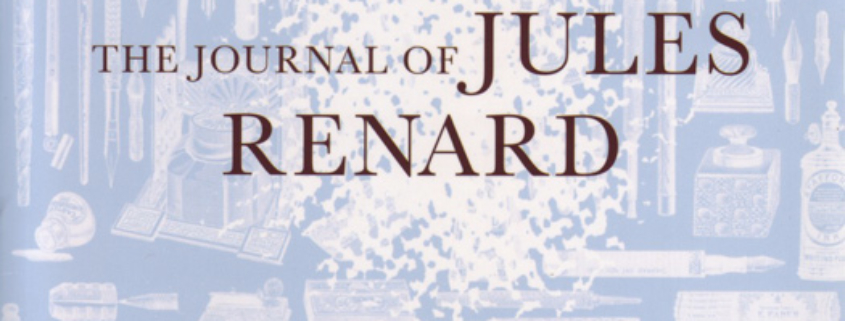On Journals: The Journal of Jules Renard
In the digital age, there is an incessant drive to “share” what you’re thinking, doing, eating, writing, not writing, obsessing about. This starts to feel like a bright and shiny red alarm button, urging me to cast my words out into the world: comment on social media posts or online articles, rant about a television show in a blog post, and send a story, essay, or poem out to a publication before it’s ready, just to see if they’ll take it. I try and second-guess myself before I do anything too rash, and ask why it matters if I do send my thoughts or opinions out into the digital universe, whether they are random or well-articulated. What am I actually saying with this Tweet? Do I like the publication I’m sending my work to, and why? Or do I just see a “Submit!” button and want to click “send” for the endorphin rush of anticipating a response?
Or, am I too hesitant about engaging on social media, too cautious? After all, if you don’t make your presence known, it’s only known to yourself. It’s a modern day conundrum: to share or not to share. Still, in order to contribute to the social conversation happening online about any topic—instead of just throwing your opinions against the wall like a wet noodle and hoping they’ll stick—you have to have a well-rounded and thoughtful perspective on that topic. For me, there is at least one social conversation online I find relatively easy to contribute to: books.
“What’s your favorite book?” is one of the most difficult questions to answer outright. Many writers will say is its just too vague and leading: favorite when I was a child? When I was a teenager? As an adult? To read while traveling? On the workday commute? While lounging around on a rainy Sunday afternoon? The possible differentiations are endless.
If I could rephrase the question for myself at this given point in my life, I would ask: what book made me think I could be a writer? What book gave me the audacity to even consider that such a scenario would be possible? How could I compare with all of the other writers out there (and whose numbers are increasing?) Why would anyone care about my words over all of these other words?
The Journal of Jules Renard is a book I picked up on a whim at the Los Angeles Times Festival of Books several years ago. It details the French playwright and novelist’s journal entries each month from 1887 to 1910. Some entries consist of past memories and are longer, but some are just one line. For example, in December of 1891, Renard writes: “How vain is an idea! Without the sentence, I’d retire.” Or this gem from July of 1895: “All our criticism consists of reproaching others with not having the qualities we believe ourselves to have.”
It is a book that revealed to me as a writer that my words matter because they matter to me, and that I need to write them down. If I share them, then maybe I am all the better for it, but if I don’t, then they are also fine to remain as my own kind of proof of existence in the world. I know that writers are often told that it’s pointless to toil away in obscurity. That said, to articulate an idea into actual words and sentences, it takes time. This can be difficult to achieve if you are craving an opinion or feedback on what you’ve written preemptively.
What strikes me the most about The Journal of Jules Renard is how easily Renard’s entries translate into the modern day. One of my favorite excerpts is from June 1902: “The writer must create his own language, and not use that of his neighbor. He must be able to watch it grow.”
I don’t always keep a journal myself, but at times when I’m wrapped up in a fit of emotional frustration and need to vent without subjecting all of my wailing to a kind friend’s ear, I journal either by hand or on a computer. Journaling is a good place to go when I feel emotionally boxed into a situation and can’t find a way out. It’s also how I dialogue with myself on paths to take out of serious issues or nagging concerns.
I admire the diligence with which Renard administered his journaling without the distractions of the modern world, and the book itself is a window into his life, in general and as a writer. If you had to ask yourself: How would you define the difference between the thoughts that are yours alone, and the ones that you share online?
A more recent book that also speaks to the value in journaling is Sarah Manguso’s Ongoingness: The End of a Diary (Graywolf), an essayistic take on her diary entries over the span of twenty-five years. In an article about Manguso’s book in The New Yorker, Alice Gregory writes: “In her memoir, Manguso makes the striking decision never to quote the diary itself. As she started to look through the old journals…she became convinced that it was impossible to pull the ‘best bits’ from their context without distorting the sense of the whole.”
What book (or books) you’re reading can say a lot about you as a reader—whether or not others have heard of it, have read it themselves, and where they place it in their own esteem. Another way to look at this question is why a book matters to you not just as a reader—but as a writer.
Erin Anadkat is a MFA candidate in Creative Writing at Antioch University Los Angeles. http://www.erinanadkat.tumblr.com/, https://twitter.com/erinanadkat






